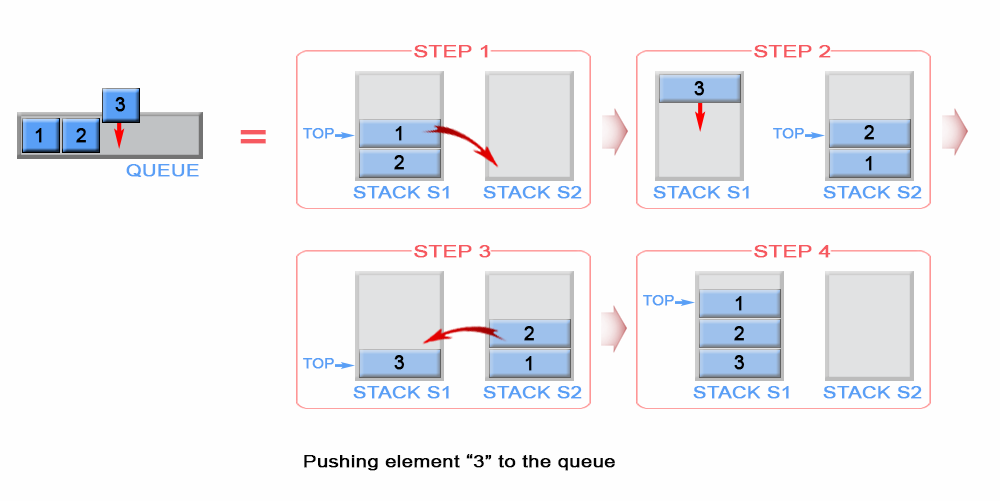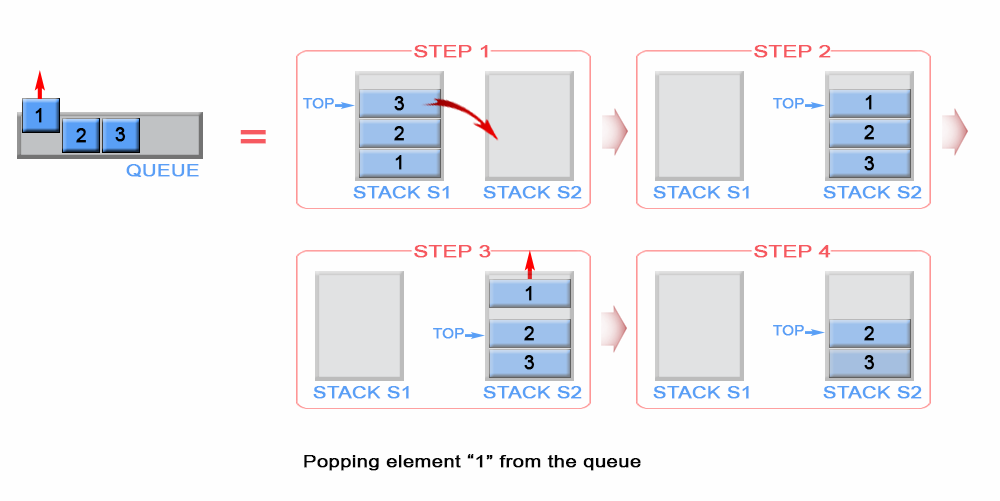[LeetCode] 232. Implement Queue using Stacks_Easy tag: Design
2018-08-16 09:49 Johnson_强生仔仔 阅读(238) 评论(0) 编辑 收藏 举报Implement the following operations of a queue using stacks.
- push(x) -- Push element x to the back of queue.
- pop() -- Removes the element from in front of queue.
- peek() -- Get the front element.
- empty() -- Return whether the queue is empty.
Example:
MyQueue queue = new MyQueue(); queue.push(1); queue.push(2); queue.peek(); // returns 1 queue.pop(); // returns 1 queue.empty(); // returns false
Notes:
- You must use only standard operations of a stack -- which means only
push to top,peek/pop from top,size, andis emptyoperations are valid. - Depending on your language, stack may not be supported natively. You may simulate a stack by using a list or deque (double-ended queue), as long as you use only standard operations of a stack.
- You may assume that all operations are valid (for example, no pop or peek operations will be called on an empty queue).
这个题目可以用两个stack, 基本思路是如@elmirap提出来的Solution, 两种方式, 第一种是O(n) push, 其他都是O(1)

Code:
class MyQueue(object): ##Solution # two stacks, O(n) push operation def __init__(self): """ Initialize your data structure here. """ self.stack = [] self.backup = [] def push(self, x): """ Push element x to the back of queue. :type x: int :rtype: void """ while self.stack: self.backup.append(self.stack.pop()) self.stack.append(x) while self.backup: self.stack.append(self.backup.pop()) def pop(self): """ Removes the element from in front of queue and returns that element. :rtype: int """ return self.stack.pop() def peek(self): """ Get the front element. :rtype: int """ return self.stack[-1] def empty(self): """ Returns whether the queue is empty. :rtype: bool """ return not self.stack # Your MyQueue object will be instantiated and called as such: # obj = MyQueue() # obj.push(x) # param_2 = obj.pop() # param_3 = obj.peek() # param_4 = obj.empty()
第二种方式, 平均pop为O(1), 其他都为O(1), 思路实际上类似, 但是在Stack2不急着将其搬回stack1, 因为在stack1搬到stack2之后已经将最后的放在最下面了.所以节约了时间.

Code:
class MyQueue: def __init__(self): """ Initialize your data structure here. """ self.stack = [] self.queue = [] def push(self, x): """ Push element x to the back of queue. :type x: int :rtype: void """ self.stack.append(x) def pop(self): """ Removes the element from in front of queue and returns that element. :rtype: int """ if not self.queue: while self.stack: self.queue.append(self.stack.pop()) return self.queue.pop() def peek(self): """ Get the front element. :rtype: int """ return self.queue[-1] if self.queue else self.stack[0] def empty(self): """ Returns whether the queue is empty. :rtype: bool """ return not self.stack and not self.queue # Your MyQueue object will be instantiated and called as such: # obj = MyQueue() # obj.push(x) # param_2 = obj.pop() # param_3 = obj.peek() # param_4 = obj.empty()

